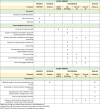A protocol of a pilot randomised trial (Action-RESPOND) to support rural and regional communities with implementing community-based systems thinking obesity prevention initiatives
- PMID: 38696541
- PMCID: PMC11065269
- DOI: 10.1371/journal.pone.0302047
A protocol of a pilot randomised trial (Action-RESPOND) to support rural and regional communities with implementing community-based systems thinking obesity prevention initiatives
Abstract
Background: Over a quarter of children aged 2-17 years living in Australia are overweight or obese, with a higher prevalence reported in regional and remote communities. Systems thinking approaches that seek to support communities to generate and implement locally appropriate solutions targeting intertwined environmental, political, sociocultural, and individual determinants of obesity have the potential to ameliorate this. There have however been reported challenges with implementation of such initiatives, which may be strengthened by incorporating implementation science methods.
Methods: This pilot randomised controlled trial protocol outlines the development and proposed evaluation of a multicomponent implementation strategy (Action-RESPOND). to increase the implementation of community-based systems thinking child obesity prevention initiatives The target of this intervention is ten rural and regional communities (or local government areas as the unit of allocation) within Northeast Victoria who were participants in a whole-of-systems intervention (RESPOND). Action-RESPOND builds on this intervention by assessing the impact of offering additional implementation strategies to five communities relative to usual care. The development of the multicomponent implementation strategy was informed by the Promoting Action on Research Implementation in Health Services (PARIHS) framework and consists of seven implementation strategies primarily delivered via 'facilitation' methods. Implementation strategies aimed to ensure initiatives implemented are i) evidence-based, ii) address community's specific needs and iii) are suitable for local context. Strategies also aimed to increase the community's capacity to implement, through iv) improving the health promotion team's implementation knowledge and skills, fostering v) leadership, vi) physical resources and vii) community culture to drive implementation. The feasibility, acceptability, potential impact, and cost of the strategy will be assessed at baseline and follow up using surveys administered to key representatives within the community and internal records maintained by the research team.
Discussion: By leveraging an existing community-based whole-of-systems intervention, Action-RESPOND offers a unique opportunity to collect pilot feasibility and early empirical data on how to apply implementation and systems science approaches to support obesity prevention in rural and regional communities in Victoria.
Copyright: © 2024 Yoong et al. This is an open access article distributed under the terms of the Creative Commons Attribution License, which permits unrestricted use, distribution, and reproduction in any medium, provided the original author and source are credited.
Conflict of interest statement
S.A. is a co-inventor of the STICKE software, which is used in this study. All other authors have no conflict of interest to declare. This does not alter our adherence to PLOS ONE policies on sharing data and materials.
Figures


References
-
- World Health Organization. Obesity and overweight 2021. [23 October 2023]. Available from: https://www.who.int/news-room/fact-sheets/detail/obesity-and-overweight.
-
- Australian Institute of Health. Overweight and obesity among Australian children and adolescents. Canberra: AIHW, 2020.
-
- Jacobs J, Strugnell C, Becker D, Whelan J, Hayward J, Nichols M, et al. Understanding weight status and dietary intakes among Australian school children by remoteness: a cross-sectional study. Public Health Nutr. 2023;26(6):1185–93. Epub 2023/01/31. doi: 10.1017/S1368980023000198 - DOI - PMC - PubMed
Publication types
MeSH terms
LinkOut - more resources
Full Text Sources
Medical

